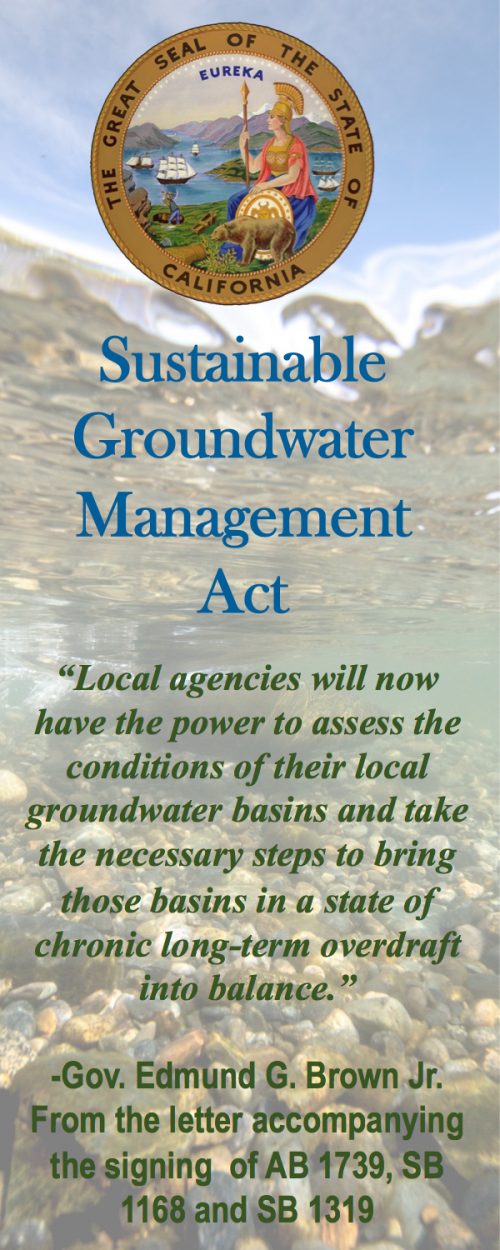California’s Sustainable Groundwater Management Act
 In 2014 California took a historic step with the passage of the Sustainable Groundwater Management Act (Cal. Water Code §10720-10737). SGMA adopts, for the first time, a statewide requirement that groundwater resources be managed “sustainably for long-term reliability and multiple economic, social, and environmental benefits for current and future beneficial uses.” SGMA defines sustainable management as “management and use of groundwater in a manner that can be maintained during the [50-year] planning and implementation horizon without causing undesirable results” (Cal. Water Code § 10721). The six undesirable results described include significant and unreasonable (1) depletion of supply, indicated by chronic lowering of groundwater levels; (2) reduction of groundwater storage; (3) seawater intrusion; (4) degraded water quality; (5) land subsidence that substantially interferes with surface land uses; and (6) adverse impacts on the beneficial uses of interconnected surface water due to depletions (Cal. Water Code § 10721).
In 2014 California took a historic step with the passage of the Sustainable Groundwater Management Act (Cal. Water Code §10720-10737). SGMA adopts, for the first time, a statewide requirement that groundwater resources be managed “sustainably for long-term reliability and multiple economic, social, and environmental benefits for current and future beneficial uses.” SGMA defines sustainable management as “management and use of groundwater in a manner that can be maintained during the [50-year] planning and implementation horizon without causing undesirable results” (Cal. Water Code § 10721). The six undesirable results described include significant and unreasonable (1) depletion of supply, indicated by chronic lowering of groundwater levels; (2) reduction of groundwater storage; (3) seawater intrusion; (4) degraded water quality; (5) land subsidence that substantially interferes with surface land uses; and (6) adverse impacts on the beneficial uses of interconnected surface water due to depletions (Cal. Water Code § 10721).
To achieve this goal, SGMA required the formation of new local-level institutions for groundwater governance by June 30, 2017. These ‘Groundwater Sustainability Agencies’ (GSAs) are legal governmental organizations that were self-organized by any existing city, county, public utility, special district, or combination thereof subject to formal recognition by the state. In forming GSAs, local decision-makers were allowed to select the geographic boundaries of the portion of the basin they will manage. Multiple GSAs could form within a basin, so long as they do not overlap. SGMA delegates substantial authorities to GSAs and mandates they develop and implement groundwater sustainability plans (GSPs) that will lead to groundwater sustainability within 20 years of plan adoption. When developing GSPs, GSAs are required to conduct data collection, monitor and report on basin conditions, specify groundwater management goals and sustainability criteria with measurable objectives and milestones, and develop management plans to achieve those goals.
SGMA requires groundwater sustainability be achieved at the basin-scale. Where multiple GSAs formed within a basin, SGMA requires they either work together to develop a single GSP for the entire basin or coordinate in developing and implementing their individual GSPs. GSAs in a basin must use the same groundwater data in their GSPs, develop procedures for information exchange, and describe how the plans, implemented together, satisfy the requirements of SGMA. Failure to do so will result in takeover of groundwater management by state government and the imposition of fees to cover the costs of state intervention (Cal. Water Code §10735).
Image from DWR SGMA FAQ